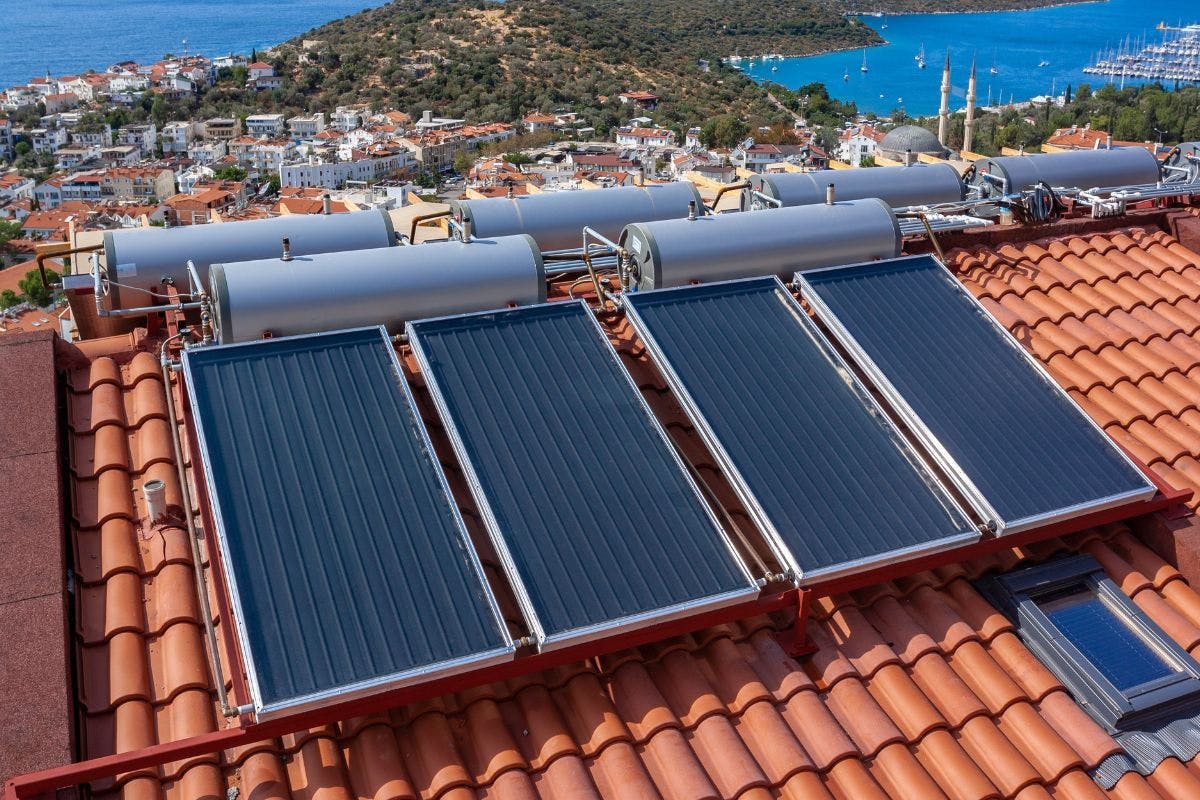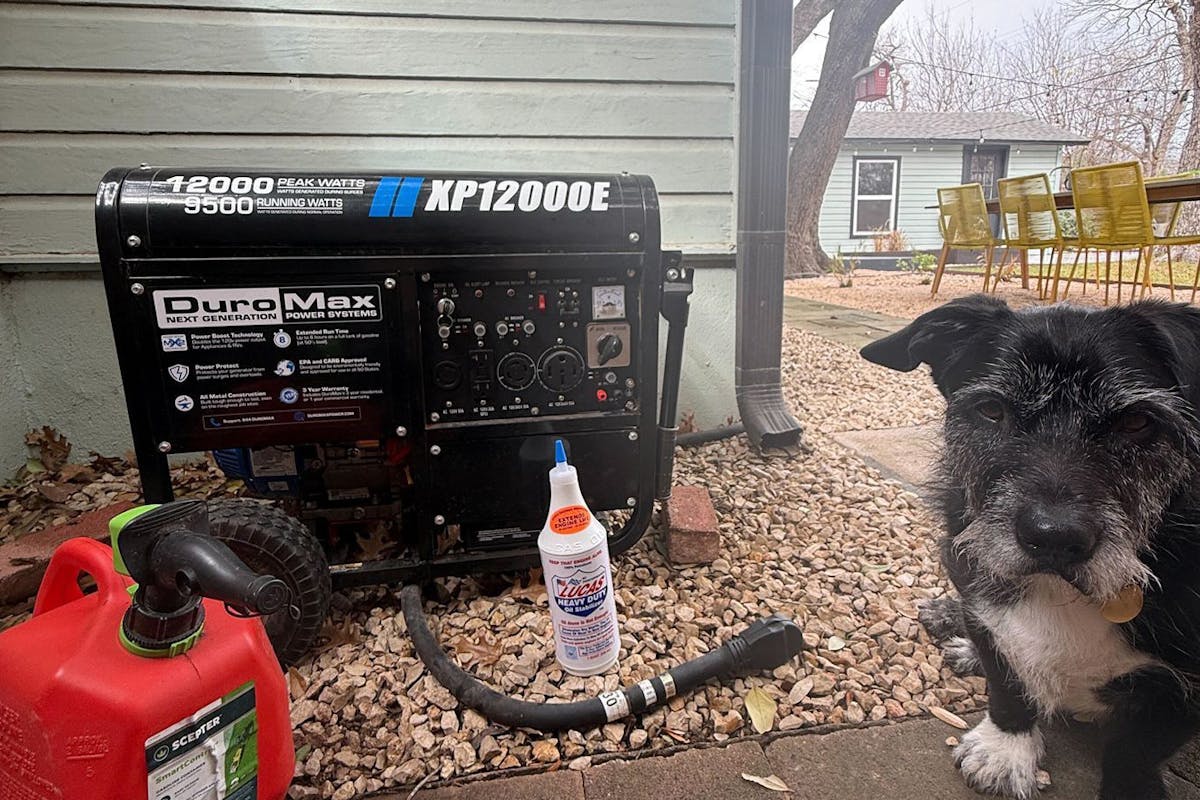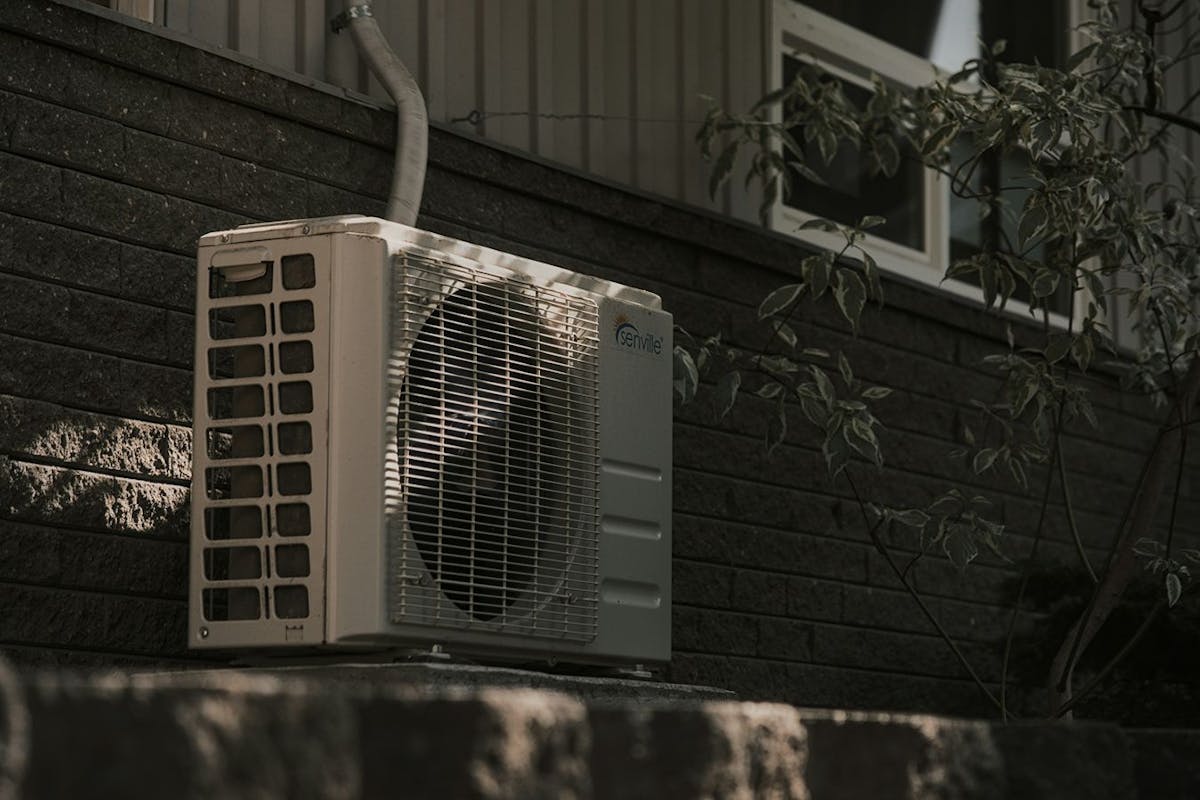Solar Water Heaters: Definition, Pros, Cons, and Alternatives
Last edited
Author
Andrew Giermak
Solar and Electrification Writer and Editor
Editor
Andrew Blok
Electrification and Solar Writer and Editor

The sun makes things warmer, and one of those things could be the water you use at home. Solar water heaters are a cost-effective and quite environmentally friendly way to get hot water. There are situations where solar water heaters work well for homes. But, what about your home?
There are advantages and disadvantages to solar water heaters. We’ll go into when a solar water heater could be a good consideration for you, and when using home solar panels and a more common water heating method is probably best.
See how much you can save with home energy changes
What Are Solar Water Heaters?
Solar water heaters are a cost-effective way to heat a home’s water supply with the power of the sun. Most solar water heaters harness the sun’s thermal energy (or heat) by directly allowing sunlight to warm an outdoor water supply or by using special solar thermal energy collectors.
It’s important to know thermal solar collectors are distinct from photovoltaic (PV) solar energy systems. You can heat your water with the electricity generated by PV solar panels, but self-contained thermal solar water heaters are a separate solution that could also reduce your energy consumption and cost.
How Much Could You Save Switching to Solar Hot Water?
The US Department of Energy estimates, on average, a home water heating bill drops 50-80% by installing a solar water heater. How much you may save depends on multiple factors.
- Your geographic location and area’s climate
- Your water usage
- The system’s performance
- Available incentives
- Financing or refinancing terms
- If the installation is part of new construction, and can be included in a mortgage
- The cost of the utility-supplied energy you’re reducing or eliminating
How Do Solar Water Heaters Work?
Solar water heating systems come in many shapes and sizes. More than anything, however, the differences between an active and passive solar water heater are important to understand.
Knowing how passive and active solar water heater systems work can prevent you from choosing the wrong technology for your home.
Passive solar water heaters
Passive solar water heating is about as simple as home hot water can get. It is a purely solar-powered water heating system that lacks moving parts, additional energy resources, and significant upfront costs. A typical passive solar water heater consists of not much more than a large rooftop tank (known as a batch collector), where the water is warmed by the sun before flowing into your home’s plumbing system.
As far as being environmentally friendly and taking your fuel usage and carbon emissions closer to zero, this is as green as it gets.
Although less effective for controlling the temperature of your hot water than an active system, passive solar water heaters are often feasible solutions for warm climate areas that rarely experience below-freezing temperatures. Relying on daily sunshine to heat the water tank, passive solar water heaters are generally better at delivering hot water towards the end of the day, rather than in the morning.
Active solar water heaters
Despite higher costs, active solar water heaters are the most common solar water heating appliances installed in the US because they are much more efficient than passive systems. By definition, active solar water heaters add an “active” element to the water heating process with an electric pump and valve controls to push either water or a heat-exchanging liquid throughout the entire system.
Here, an active direct solar water heater warms your home’s water directly with the sun. In contrast, an active indirect solar water heater uses the sun to warm a separate fluid before transferring the heat from that fluid to your water supply. By keeping your water indoors, active indirect solar water heaters are the preferred technology for climates that frequently dip below freezing temperatures.
When paired with a photovoltaic solar system to save money on electricity, active solar water heaters can be powered by the sun in two separate ways — by collecting heat through its thermal components and operating the pump controls with solar electricity.
See how much you can save with home energy changes
Solar Water Heater Advantages & Disadvantages
Compared to conventional water heating systems, solar water heaters can bring your home into a greener and more efficient future full of energy cost savings. With that said, savings with a solar water heater aren’t the same for everyone. Switching may not be worth it for your needs, especially once you consider some advantages and disadvantages.
Solar water heater advantages
- Powered by solar energy, so no costs or carbon emissions from fossil fuels
- Capable of partial or entirely off-grid operation to reduce utility energy dependence
- A reliable source of hot water in all American climates
- May qualify for energy incentives and rebates at the federal, state and/or local levels
- Financial and environmental impact when paired with solar panels
Solar water heater disadvantages
- Higher upfront costs than most conventional water heating systems
- Almost always must be supplemented with grid energy or a backup power source
- Shorter expected lifespan than solar panel systems
- Operational cost savings are tied to the availability of sunlight — daily and seasonally
- Can require a large amount of roof and indoor space for system components
Are Solar Water Heaters Worth It?
If the sun shines on your roof and there is room for thermal energy collectors, solar water heaters could be worth it to save money on long-term energy costs with a sustainable, green power source.
In the US, you may be able to reduce your total solar water heater installation costs by up to 30% with federal clean energy tax credits. The federal income tax credit is part of the Residential Clean Energy Credit and when it’s time to do your taxes, you’ll need IRS Form 5695. The credit can cover taxes you owe or have paid that year and can be rolled over to future years. Consult your tax advisor to confirm your eligibility.
There may be other rebates or incentives available in your state, city, or utility service area.
While an excellent idea for many, whether or not solar water heaters are the absolute best choice for your home depends on several unique factors, including your local climate, the other energy systems on your property, and your personal hot water demand.
Before moving forward with installing a solar water heater, we recommend evaluating all your hot water options to find the most energy-efficient (and cost-saving) solution.
Solar Water Heaters vs. Conventional Water Heaters
Conventional water heaters, also known as storage water heaters, are similar to the solar systems we’ve covered, with the sole difference being the energy source. While solar hot water systems can utilize renewable and emission-free solar power, most conventional water heaters run on natural gas or electricity supplied from the power grid.
Energy Star reports homeowners can cut their annual hot water costs by 50% or more compared to conventional water heating systems by switching to a solar water heater. Today, many solar water heaters can be classified as hybrid systems because they use a secondary source of power (like gas or electricity) to boost performance when needed. This can be on cold mornings, overcast days, or whenever solar thermal alone is not enough to meet home hot water demands.
Solar Water Heaters vs. Energy-Efficient Water Heaters
Of course, thermal solar hot water heaters are not the only technology on the market that could be used to help reduce your hot water energy consumption and costs. For instance, heat pump water heaters capture heat from the air surrounding your home and transfer it to your water tank.
Note: Heat pumps are also a popular furnace and air conditioning alternative. Read more about residential heat pumps for heating and cooling.
Besides heat pump water heaters, tankless water heaters can also help you reduce unnecessary power use by heating water on demand instead of constantly using energy to maintain high temperatures in a large storage tank. Especially when combined with a PV system, high-efficiency hybrid or electric water heaters are a great energy-saving solar water heater alternative that can keep your water heating costs low.
Key Takeaways for Solar Water Heaters
To summarize, let’s look at a few of the most important aspects of solar water heaters we’ve discussed.
- Solar water heaters use the sun’s thermal energy to heat your home’s water supply.
- Active indirect solar water heaters are the most common solar water heating systems used to deliver year-round, reliable hot water in most American climates.
- Solar water heaters save homeowners money on energy costs compared to conventional hot water systems and buyers will usually qualify for several financial incentives.
- Before purchasing a solar water heater, consider weighing its costs, energy efficiency, and fit for your needs against other technologies, such as tankless or heat pump systems.
Rooftop solar panels can reduce the cost of operating any electric water heater. In fact, they can reduce electric consumption across the board, lower energy bills, and power your home with clean, independent power. Estimate out what you could save by switching to solar with Palmetto’s free solar savings calculator and see what you could save with other home energy changes with Palmetto’s Energy Advisor.
See what home electrification can do for you:
Solar Water Heater FAQs
How could solar water heating save you money?
On average, going to solar water heating saves about 50-80% on water heating expenses according to the Department of Energy. The exact savings will depend on factors such as your area’s climate, your usual hot water usage, and incentives such as tax credits or rebates.
What are some of the limitations of solar water heaters?
Limitations or disadvantages to consider include needing the right amount of roof and interior space for the system, and knowing you may need to have a secondary power source as part of your water heating system. With a passive solar water heating system, your climate and water needs are more important to consider as the sun and natural climate will determine how hot your hot water is.
Why do most people use active solar water heaters?
Active solar water heaters are more common than passive water heaters because they provide more predictable and controllable hot water. Active solar water heaters have an “active” element to provide heat.
Disclaimer: This content is for educational purposes only. Palmetto does not provide tax, legal, or accounting advice. Please consult your own tax, legal, and accounting advisors.


